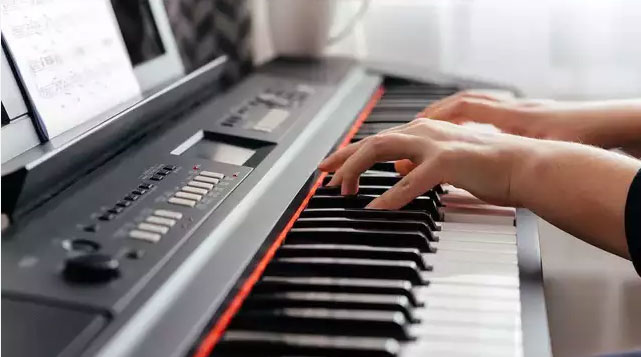2024 Digital Piano: From Yamaha to Donner, Find the Right 88-Key Weighted Keyboard for You
Choosing the right digital piano in 2024 is more challenging than ever, with numerous models offering various features that cater to different needs. Whether you’re a beginner or a professional musician, finding an 88-key weighted keyboard that fits your budget and playing style is crucial.

The Importance of an 88-Key Weighted Keyboard
88-key weighted keyboards closely mimic the feel and response of an acoustic piano, making them essential for players seeking an authentic experience. These keyboards provide dynamic control over your playing, which is crucial for both beginners learning technique and professionals requiring expressive capability.
Top 10 Digital Piano Brands in the US (2024)
| Brand | Model | Price Range | Key Features |
|---|---|---|---|
| Yamaha | P45, P225 | $500 – $1,200 | Graded hammer action, compact design, dual-mode. |
| Roland | RD-2000 | $2,400 – $3,000 | Professional features, advanced key action, integrated effects. |
| Casio | PX-S1100 | $700 – $1,000 | Slim design, Bluetooth connectivity, Smart Scaled Hammer Action. |
| Korg | B2, D1 | $600 – $1,300 | Realistic key action, variety of sound options. |
| Kawai | ES920, ES520 | $1,300 – $1,900 | Responsive Hammer III action, Virtual Technician feature. |
| Donner | DEP-20, DEP-45 | $400 – $700 | Affordable, weighted keys, multiple voices. |
| Nord | Piano 5 | $3,000 – $4,000 | High-quality sound engine, stage-friendly design. |
| Alesis | Recital Pro | $350 – $500 | Beginner-friendly, adjustable touch response, portable. |
| Kurzweil | SP6, Forte | $1,500 – $4,500 | Advanced sound engine, robust build quality. |
| Arturia | KeyLab 88 MkII | $900 – $1,200 | Versatile, excellent MIDI controller functionality. |
Key Considerations When Choosing a Digital Piano
Sound Quality
- The sound engine of a digital piano significantly impacts its realism. Yamaha and Roland are known for their high-quality sound engines, which offer rich, dynamic tones that closely replicate acoustic pianos.
Key Action
- The feel of the keys, or key action, is crucial. Weighted keys that simulate the hammer action of an acoustic piano are ideal for those serious about their technique. Brands like Kawai and Roland excel in providing a realistic touch.
Portability
- If you need a piano for performances or limited space, portability is a key factor. Casio’s PX-S1100 is known for its slim, lightweight design without compromising sound quality.
Additional Features
- Connectivity options such as Bluetooth, MIDI compatibility, and USB ports can enhance your practice and performance experience. Alesis Recital Pro is particularly beginner-friendly with its versatile features at a lower price point.
Q&A: Common Questions About Digital Pianos
Q: Do I need a digital piano with built-in speakers?
- A: Built-in speakers are convenient for home practice, but if you’re performing or recording, connecting to external speakers or an amplifier might be more suitable. Models like the Roland RD-2000 are designed for professional use and might not include powerful built-in speakers.
Q: How important is polyphony in a digital piano?
- A: Polyphony refers to the number of notes a digital piano can produce simultaneously. For beginners, 64-note polyphony might be sufficient, but for more advanced players, especially those using sustain pedals or layering sounds, 128-note or higher polyphony is recommended.
Q: Is it worth investing in a high-end digital piano?
- A: If you’re a serious musician or plan to perform professionally, investing in a high-end model like the Nord Piano 5 can offer advanced features, superior sound quality, and durability that entry-level models may lack.
Case Study: Yamaha P225 vs. Donner DEP-45
Yamaha P225
- Price: ~$1,200
- Pros: Advanced key action, high-quality sound samples, dual-mode for splitting the keyboard.
- Cons: Higher price point, fewer onboard sounds compared to competitors.
Donner DEP-45
- Price: ~$500
- Pros: Affordable, solid build quality, suitable for beginners.
- Cons: Limited sound options, less realistic key action compared to Yamaha.
In comparing these models, the Yamaha P225 stands out for its superior build and sound quality, making it ideal for intermediate to advanced players. Meanwhile, the Donner DEP-45 offers a cost-effective option for beginners, albeit with some compromises in sound and touch realism.
Chart: Price vs. Features Comparison
| Feature | Yamaha P225 | Donner DEP-45 | Roland RD-2000 |
|---|---|---|---|
| Price | $1,200 | $500 | $2,600 |
| Key Action | Graded Hammer | Semi-weighted | Advanced Hammer |
| Polyphony | 192 | 128 | Unlimited |
| Built-in Speakers | Yes | Yes | No |
| Connectivity Options | Bluetooth, USB | USB | Extensive MIDI |
| Portability | Moderate | High | Low |
Final Recommendations
- Best for Beginners: Donner DEP-45 – A budget-friendly option with all the basics you need to start your piano journey.
- Best All-Around: Yamaha P225 – A perfect balance of price, quality, and features for intermediate players.
- Best for Professionals: Roland RD-2000 – A robust, feature-rich digital piano designed for the stage and studio.
References







Recent Comments